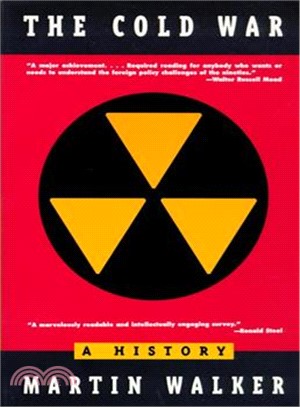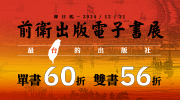The Cold War ─ A History
商品資訊
ISBN13:9780805034547
出版社:Henry Holt & Co
作者:Martin Walker
出版日:1995/06/01
裝訂:平裝
規格:21.0cm*14.6cm*3.2cm (高/寬/厚)
商品簡介
作者簡介
相關商品
商品簡介
"The history of the Cold War has been the history of the world since 1954." So begins this wide-ranging narrative by an award-winning political commentator, which is the first major study of the Cold War. Now that it is over, it is crucial to our future to understand how the Cold War has shaped us and, especially, to recognize it as the economic and political dynamic that determined the structure of today's global economy.
From the origins of the Marshall Plan, which revived Europe after World War II, and the strategic decision to rebuild a defeated Japan into a bulwark against China to the collapse of the Berlin Wall, this authoritative work reveals how the West was built into an economic alliance that overpowered the Soviet economy while also unleashing global economic forces that today challenge the traditional nation-state.
The Cold War was more of a global conflict than was either of this century's two major wars; far more than a confrontation between states or even empires, it was, as Martin Walker puts it "a total war between economic and social systems, an industrial test to destruction."
Walker reminds us how easy it is to forget that there were many occasions for the late 1940s on when victory seemed far from assured, and that lent a particular urgency to the efforts of postwar Western leaders. The West continued to be alarmed by the prospect of defeat right up to the Soviet empire's last breath. At the end of the 1940s the fear was generated by communist expansion into Eastern Europe and China; in the 1960s by the prospect of defeat in Vietnam. In the 1970s the failure of détente and the West's economic crisis brought a new generation of dedicated anti-Communists to prominence. For more than forty years, as this detailed analysis makes clear, the outcome of the Cold War was in doubt.
We also come to understand how the arms race caused new alignments and shifts in domestic power. As the United States became the national security state, California, which had a population of five million at the start of the Cold War, grew to thirty million and, by the 1980s provided one in every ten members of Congress and two presidents.
Using newly opened Kremlin archives and his own experiences in the field, the author has written a brilliant analysis of the conflict that has shaped the contemporary world. Martin Walker is the U.S. bureau chief for The Guardian (London), a regular commentator for CNN, and a columnist for newspapers in the United States, Europe, and Moscow. A published novelist and poet, he lives in Washington, D.C. with his wife, the novelist Julia Watson, and their two daughters.
From the origins of the Marshall Plan, which revived Europe after World War II, and the strategic decision to rebuild a defeated Japan into a bulwark against China to the collapse of the Berlin Wall, this authoritative work reveals how the West was built into an economic alliance that overpowered the Soviet economy while also unleashing global economic forces that today challenge the traditional nation-state.
The Cold War was more of a global conflict than was either of this century's two major wars; far more than a confrontation between states or even empires, it was, as Martin Walker puts it "a total war between economic and social systems, an industrial test to destruction."
Walker reminds us how easy it is to forget that there were many occasions for the late 1940s on when victory seemed far from assured, and that lent a particular urgency to the efforts of postwar Western leaders. The West continued to be alarmed by the prospect of defeat right up to the Soviet empire's last breath. At the end of the 1940s the fear was generated by communist expansion into Eastern Europe and China; in the 1960s by the prospect of defeat in Vietnam. In the 1970s the failure of détente and the West's economic crisis brought a new generation of dedicated anti-Communists to prominence. For more than forty years, as this detailed analysis makes clear, the outcome of the Cold War was in doubt.
We also come to understand how the arms race caused new alignments and shifts in domestic power. As the United States became the national security state, California, which had a population of five million at the start of the Cold War, grew to thirty million and, by the 1980s provided one in every ten members of Congress and two presidents.
Using newly opened Kremlin archives and his own experiences in the field, the author has written a brilliant analysis of the conflict that has shaped the contemporary world. Martin Walker is the U.S. bureau chief for The Guardian (London), a regular commentator for CNN, and a columnist for newspapers in the United States, Europe, and Moscow. A published novelist and poet, he lives in Washington, D.C. with his wife, the novelist Julia Watson, and their two daughters.
作者簡介
Martin Walker is the U.S. bureau chief for The Guardian (London), a regular commentator for CNN, and a columnist for newspapers in the United States, Europe, and Moscow. A published novelist and poet, he lives in Washington, D.C. with his wife, the novelist Julia Watson, and their two daughters.
主題書展
更多
主題書展
更多書展今日66折
您曾經瀏覽過的商品
購物須知
外文書商品之書封,為出版社提供之樣本。實際出貨商品,以出版社所提供之現有版本為主。部份書籍,因出版社供應狀況特殊,匯率將依實際狀況做調整。
無庫存之商品,在您完成訂單程序之後,將以空運的方式為你下單調貨。為了縮短等待的時間,建議您將外文書與其他商品分開下單,以獲得最快的取貨速度,平均調貨時間為1~2個月。
為了保護您的權益,「三民網路書店」提供會員七日商品鑑賞期(收到商品為起始日)。
若要辦理退貨,請在商品鑑賞期內寄回,且商品必須是全新狀態與完整包裝(商品、附件、發票、隨貨贈品等)否則恕不接受退貨。
























